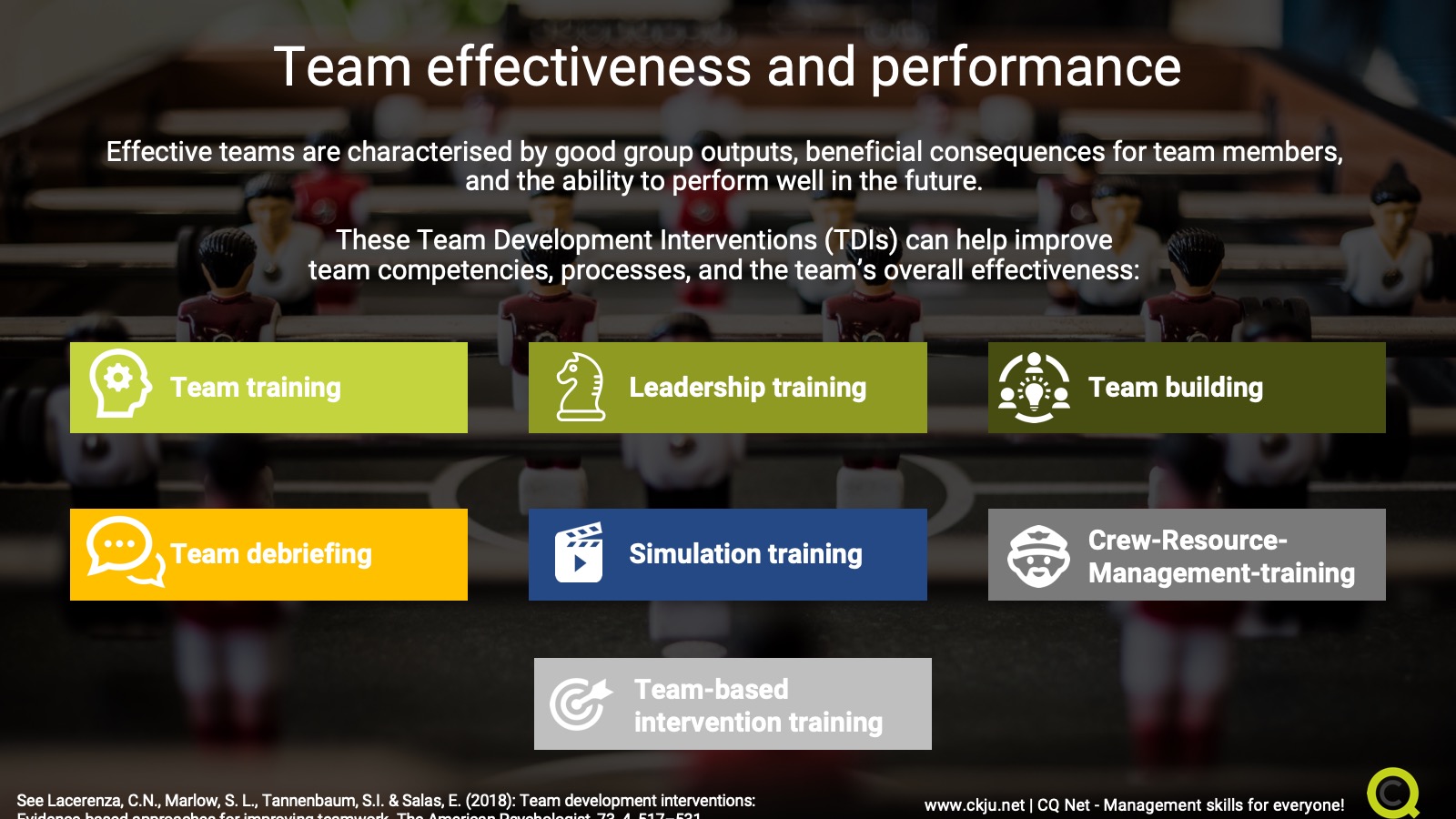- All Management Learning Resources
- team effectiveness and team performance

Executive summary
Many organizations are utilizing teams to gain a competitive advantage in the workplace. In this CQ Dossier, we take a closer look at team effectiveness and its relationship to team performance. Based on this analysis, we ask how organizations can utilize team development interventions (TDI) to increase team effectiveness and provide best practices that can be used right away.
Contents
- Executive summary
- What is team effectiveness and how is it related to team performance?
- What makes a team effective in practice?
- What are best practices in implementing team-development interventions?
- Before implementing interventions, gather information on context and needs
- Teams benefit from leaders who empower team-members
- Constant evaluation and adaptation is key to ensuring desired outcomes
- Each team-member has a competency that should be harnessed
- Teams are psychologically safe spaces that encourage expression
- Facilitators can help guide goal-setting and evaluation
- Conclusion
- Critical appraisal of team effectiveness and team performance: Solidity rating 4
- Key take-aways
- References and further reading
What is team effectiveness and how is it related to team performance?
There are several definitions regarding team effectiveness. One of the best definitions that captures both the dynamics within teams as well as the broadness of the concept is presented by Guzzo and Dickson (1996) in their review of teams within organizations:
“[team] effectiveness in groups is indicated by a) group-produced outputs (quantity or quality, speed, customer satisfaction, and so on), (b) the consequences a group has for its members, or (c) the enhancement of a team’s capability to perform effectively in the future.”
Guzzo and Dickson (1996) also discuss how scholars have utilized different terms, with many moving away from the use of the term “group” and utilizing the term “team” instead. However, they point out that there are in fact only few fundamental differences in the way groups and teams interact - therefore they believe it is satisfactory to use the terms interchangeably (Guzzo & Dickson, 1996).
Team effectiveness is also measured by outputs, linking it to team performance
Team performance is a component of team effectiveness because teams are generally considered to “perform well” when they yield superior outputs, which is one of the metrics of team effectiveness mentioned by Guzzo and Dickson above. This fits well with Salas and colleagues, who define team performance as a product of team members working together towards goals and drawing on their pool of individual and shared resources (Salas et al., 2008).
What makes a team effective in practice?
If we conceptualize an effective team as one that yields maximal, measurable output, then an effective team is one that yields high performance, high team member satisfaction, and team viability (Hackman, 1987).
Team development interventions (TDIs) can significantly improve team effectiveness and performance
Teams vary in terms of their performance, so it is important to identify interventions that are effective in boosting team effectiveness. Lacerenza et al. (2018) define a team development intervention (TDI) as “a systematic activity aimed at improving requisite team competencies, processes, and overall effectiveness.“
According to the authors, there are several types of team development interventions, including:
Team training
Team training is structured in similar ways to formal training programs with team members gaining a formalized and structured learning experience with learning objectives that focus on specific team competencies (Lacerenaza et al., 2018).
Leadership training
Leadership training is a TDI that seeks to increase leader knowledge, skills, and competencies through formalized and structured programs (Laceranaza et al., 2018); this training is important because effective leaders can build strong team processes through motivating and encouraging team members.
Team building
Team building is a TD that focuses on building strong internal dynamics within a team including improvements in goal-setting, relationship buildling, role clarification, and problem solving. Team debriefing occurs when team members reflect on and discuss a shared experience (Laceranaza et al., 2018).
Team debriefing
Team debriefing is useful because it helps improve teamwork processes and team members are more actively engaged through reflecting on an event, particularly when there are conflicting viewpoints about an experience.
Simulation training
Researchers and practitioners have also invested in developing and implementing simulations that attempt to mimic real world phenomena (Buljac-Samardzic et al., 2010). For example, a task can simulate a crisis in a medical setting. Simulation training can provide team members with skills that help them to make decisions in complex environments through providing real-world scenarios.
Crew Resource Management (CRM)-training
The concept of Crew Resource Management (CRM) originated from the field of aviation and CRM training equips team members with knowledge, skills, and attitudes across a range of management competencies, including communication, problem-solving and team work (Buljac-Samardzic et al., 2010).
Team-based intervention training
Team training incorporates different forms of training that have objectives such as goal setting and building trust among team members (Buljac-Samardzic et al., 2010).
What are best practices in implementing team-development interventions?
In their review of team-development interventions (TDIs), Laceranaza and colleagues (2018) provide recommendations on how best to implement TDIs. The recommendations are grounded in learning principles that are effective across individuals, settings, and teams.
Before implementing interventions, gather information on context and needs
It is important in all general training to conduct a needs-analysis at both the organizational, team, and individual level and to ensure that training objectives are aligned with the objectives of the firm (Laceranaza et al., 2018). The most effective TDIs use a variety of training methods and techniques to incorporate information, demonstration, hands-on experience, and feedback sessions.
Teams benefit from leaders who empower team-members
Leadership training needs to focus on equipping team leaders with interpersonal and intrapersonal skills to enable them to increase teamwork effectiveness. Organizations can focus on specific types of leadership training such as transformational or visionary leadership that include a focus on empowering team members (Laceranaza et al., 2018).
Constant evaluation and adaptation is key to ensuring desired outcomes
Evaluation is important with a focus on cognitive and skill-based outcomes to ensure that leaders have acquired the necessary skills to foster team effectiveness. When designing team training, it is important to establish goals at the team level, rather than focus on individual progress. In addition to outcomes such as performance, professionals can also evaluate team processes such as communication and it is important to ensure that team members feel psychologically safe during the training process (Laceranaza et al., 2018).
Each team-member has a competency that should be harnessed
For effective management of team building as a TDI, professionals should conduct a needs-analysis to determine competencies that team members need such as problem-solving, goal setting etc. It is also important during team building to include instructional technqiues that enhance team self-discovery; this can include discussions and exercises that focus on self-assessment and plans that guide teams to establish agreements (Laceranaza et al., 2018).
Teams are psychologically safe spaces that encourage expression
Finally, the best practices for effective team debriefing include examining whether team members are ready to experience debriefing. This includes ensuring that, within teams, there exists a psychologically safe environment so team members feel comfortable expressing their viewpoints.
Facilitators can help guide goal-setting and evaluation
Laceranza and colleagues (2018) also suggest using a trained faciliator who can provide structure to the debriefing process. For team debriefing to be effective, it is also important to focus on performance and team-based outcomes rather than discussing events in a chronological order. This ensures that teams stay focused during a team debriefing.
Conclusion
Effective teams are those that are productive and also have strong team processes to ensure that they reach their goals. Organizations can enhance team effectiveness using team development interventions (TDIs) that focus on equipping leaders and team members with skills and competencies and also foster a beneficial organizational environment, which allow team members to be effective.
Critical appraisal of team effectiveness and team performance: Solidity rating 4
Based on the empirical evidence for the importance of team effectiveness, this Dossier is assigned a Level 4 rating (based on a 1- 5 measurement scale). A level 4 is the second highest rating score for a Dossier based on the evidence provided on the importance of team effectiveness. To date, the research on team effectiveness has demonstrated the importance of this construct and has demonstrated that team development interventions can bolster team effectiveness.
Key take-aways
- Team effectiveness is indicated by group outputs, consequences for team members, and ability to perform well in the future
- Team performance is a product of team members working together towards goals
- An effective team is one that yields high performance, high team member satisfaction, and team viability
- A team development intervention (TDI) is a systematic activity aimed at improving requisite team competencies, processes, and overall effectiveness
- TDIs include team training, leadership training, team building, team debriefing, simulation training, CRM-training, and team-based intervention training
- For all TDIs, it is important to conduct a needs-analysis at the organizational, team, and individual level
References and further reading
Buljac-Samardzic, M., Dekker-van Doorn, C.M., van Wijngaarden, J.D. H. & van Wijk, Kees P. (2010): Interventions to improve team effectiveness: a systematic review. In: Health policy (Amsterdam, Netherlands) 94 (3), S. 183–195. DOI: 10.1016/j.healthpol.2009.09.015.
Guzzo, R. A., & Dickson, M. W. (1996): Teams in organizations: recent research on performance and effectiveness. In: Annual review of psychology, 47, S. 307–338. DOI: 10.1146/annurev.psych.47.1.307.
Hackman, J.R. (1987). The design of work teams. In Handbook of Organizational Behavior, ed. JW Lorsch, pp. 315–42. Englewood Cliffs, NJ: Prentice-Hall
Kozlowski, S. W. J., & Ilgen, D. R. (2006): Enhancing the Effectiveness of Work Groups and Teams. In: Psychological science in the public interest: a journal of the American Psychological Society 7 (3), S. 77–124. DOI: 10.1111/j.1529-1006.2006.00030.x.
Lacerenza, C.N., Marlow, S. L., Tannenbaum, S.I. & Salas, E. (2018): Team development interventions: Evidence-based approaches for improving teamwork. The American Psychologist, 73, 4, 517–531. DOI: 10.1037/amp0000295.
Salas, E., DiazGranados, D., Klein, C., Burke, C. S., Stagl, K. C., Goodwin, G.F, & Halpin, S.M. (2008): Does team training improve team performance? A meta-analysis. In: Human factors 50 (6), S. 903–933. DOI: 10.1518/001872008X375009.
About the Author






